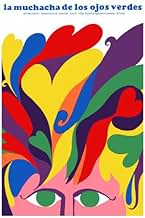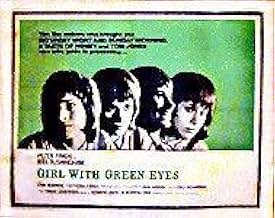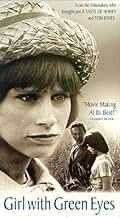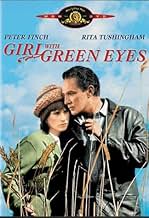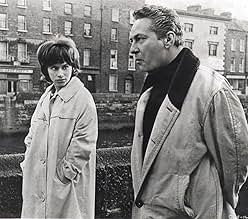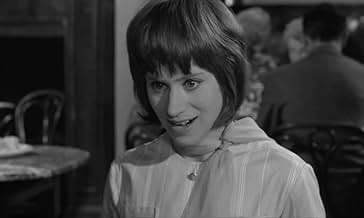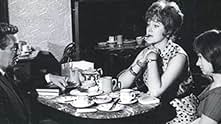NOTE IMDb
6,9/10
1,6 k
MA NOTE
Ajouter une intrigue dans votre langueIn 1960s Dublin a young girl becomes involved with an older man, a much-travelled and still-married landowner.In 1960s Dublin a young girl becomes involved with an older man, a much-travelled and still-married landowner.In 1960s Dublin a young girl becomes involved with an older man, a much-travelled and still-married landowner.
- Réalisation
- Scénario
- Casting principal
- Nomination aux 2 BAFTA Awards
- 3 victoires et 3 nominations au total
Marie Kean
- Josie Hannigan
- (as Maire Kean)
Liselotte Goettinger
- Joanna
- (as Lislott Goettinger)
Pat Laffan
- Bertie Counham
- (as Patrick Laffan)
Michael C. Hennessy
- Davey
- (as Michael Hennessy)
Joseph O'Donnell
- Patrick Devlin
- (as Joe O'Donnell)
Michael O'Brien
- The Lodger
- (as Micheal O'Briain)
David Kelly
- Ticket Collector
- (as Dave Kelly)
Avis à la une
This is a cute story about a young girl named Kate Brady, (Rita Tushingham) who lives with another girl named Baba Brenan, (Lynn Redgrave) and Baba sort of leads her roommate Kate around with her and is very talkative and has had plenty of relationships with men. However, Kate Brady becomes very interested in a man who is twice her age and begins to do everything she can to capture his attention. This man is Eugene Gaillard, (Peter Finch) who is a writer and a married man with a daughter and Eugene is not getting along very well with his wife and wants to get a divorce. Kate begins to get Eugene's full attention and before you know it, they are starting a strange relationship with each other which can lead to a great deal of trouble. Kate's family becomes involved and there are big problems facing Kate. This is a rather bitter sweet love story which is very true to what life is really all about. Enjoy.
Poor Rita Tushingham--she did seem to inherit some strangely frustrating parts.
In "A Taste of Honey" she was a young pregnant girl, first abandoned by her itinerant sailor, then landing in a "relationship" with a sadly confused chap.
In "Girl with Green Hair," she's another adolescent who falls for a man twice her age. Won't she ever learn?
Director Desmond Davis' work resembles Tony Richardson's so much that their styles are almost interchangeable. It may be because Composer John Addison also scored Richardson's "A Taste of Honey," and "Loneliness of the Long Distant Runner." It's remarkable how Addison's bleakly dissonant style so greatly influences the moods of these dramas.
With Davis employing a lot of contrapuntal passages played by a thin woodwind ensemble--often featuring a solo oboe--one does feel the emptiness and loneliness of character emotions.
There was no one who embodied the "Cockney Kitchen Sink" dramas of the 60s like Tushingham. She was perfect for her parts. Here ably supported by Peter Finch as a blase older man and Lynn Redgrave as a daftly talkative friend, Tushingham plays her role to the hilt.
By the end, the viewer has come to experience a limited encounter--rather doomed from the start--between a worldly wise Dublin land owner and working class Brit girl . . . the latter of whom is finally able to move on with her education and find acquaintances more her age.
The viewer during this visit has experienced some telling scenes of Irish-English life, and an interesting adolescent/mature fling at a brief encounter.
In "A Taste of Honey" she was a young pregnant girl, first abandoned by her itinerant sailor, then landing in a "relationship" with a sadly confused chap.
In "Girl with Green Hair," she's another adolescent who falls for a man twice her age. Won't she ever learn?
Director Desmond Davis' work resembles Tony Richardson's so much that their styles are almost interchangeable. It may be because Composer John Addison also scored Richardson's "A Taste of Honey," and "Loneliness of the Long Distant Runner." It's remarkable how Addison's bleakly dissonant style so greatly influences the moods of these dramas.
With Davis employing a lot of contrapuntal passages played by a thin woodwind ensemble--often featuring a solo oboe--one does feel the emptiness and loneliness of character emotions.
There was no one who embodied the "Cockney Kitchen Sink" dramas of the 60s like Tushingham. She was perfect for her parts. Here ably supported by Peter Finch as a blase older man and Lynn Redgrave as a daftly talkative friend, Tushingham plays her role to the hilt.
By the end, the viewer has come to experience a limited encounter--rather doomed from the start--between a worldly wise Dublin land owner and working class Brit girl . . . the latter of whom is finally able to move on with her education and find acquaintances more her age.
The viewer during this visit has experienced some telling scenes of Irish-English life, and an interesting adolescent/mature fling at a brief encounter.
It's just an episode but charmingly well done, Rita Tushingham shining with her eyes all through the film, well seconded by the slightly more reticent and laconic Peter Finch as the middle-aged writer with a failed family behind him and no illusions left, trying to be alone working by writing, which is difficult as Rita Tushingham keeps haunting him, and his family in America making themselves reminded by commenting on an aging man's relationship with a teenage girl with no experience - it could have been equivocal, but it isn't at all, since it is set in Ireland among angily bigotted catholics who also object against the unorthodox relationship and even try to do something about it by hard methods - there is some drama on the way. Lynn Redgrave assists Rita as well as she could and actually saves the situation in the end.
I saw this film when it was new, it was likeable enough already then, but made no lasting impression, wherefore I gave it a chance 50 years later just to refresh my memory and see what it really was all about - but it imported nothing new. It was still just an episode, charmingly well done, with the Rita's shining eyes and Peter's morose introversions - well done, indeed, but hardly universal, just local.
I saw this film when it was new, it was likeable enough already then, but made no lasting impression, wherefore I gave it a chance 50 years later just to refresh my memory and see what it really was all about - but it imported nothing new. It was still just an episode, charmingly well done, with the Rita's shining eyes and Peter's morose introversions - well done, indeed, but hardly universal, just local.
Girl with Green Eyes seems typical of the period of British "Kitchen-Sink" drama films (I saw it as the 2nd part of a double bill with The Leather Boys and the theme being Rita Tushingham performances, though this is dialed down a little from that turn), and that's what's good but not terribly memorable about it all. It's realistic in some of the basic character interactions, though it has a bouncier/more emotionally-cued up score than the material should have, if that makes sense. It seems like a minor point but Desmond Davis clearly wanted to get a lot of emotional/romantic/tragic pull out of the music by John Addison, and it may have been too much for this lot of realism (how typical this is by the way, it's produced by Tony Richardson).
The story is actually an Irish-Kitchen-Sink movie, though with a couple of British touches: a young girl in Dublin, who originally was from a fairly lower-class farm that was highly religious but working *very* Irish class all the same, is working at a bookstore and finds that there's an author that she would like to meet along with her friend/roommate Baba. Peter Finch is this man, and soon Kate, the girl of the title, takes a real liking to him, and after not too long he to her. So they "hook up", so to speak, and this brings on problems, both external in force (he's technically married with a kid in another country, she's got pressure from her family not to have anything to do with this "Godless heathen), and more about the fact that it's a man who could be old enough, if only barely, to be her father.
This is a story explored in many kind of films, whether it's throw-a-dart-and-hit a Philip Roth story, or of course Manhattan. There's enough chemistry and charm between the two leading people as Tishingham, even dialed down, is delightful, and Finch does a lot playing usually-crusty and mostly sardonic/sarcastic speaking (if there had been a remake some years back I could've seen Alan Rickman in his role), plus Lynn Redgrave being wonderful and funny in her supporting place. But there's not much here that elevates it past its time and place; it's a perfectly fine drama, and it doesn't distinguish itself past some insights, which are only insightful up to a point, that you may need to grow as a person (or can never meet the other on the flipside due to losing "youthful vigor" as an aging man) to have a relationship work sometimes.
There's a nice, tender feeling to the film, Finch and Tushingham make a good pair on screen (precisely because we kind of know, deep down, it's not only not going to work but it can't not ever work, if that makes sense, so let's see them in the little moments) and that should work for anyone looking for that. Although some things that contribute to the 'hasnt-aged-terribly-well' is, say, when the film is edited so early on in their courtship Eugene and Kate talk and one part of a sentence begins in a new location and then another and another, and it feels distracting.
The story is actually an Irish-Kitchen-Sink movie, though with a couple of British touches: a young girl in Dublin, who originally was from a fairly lower-class farm that was highly religious but working *very* Irish class all the same, is working at a bookstore and finds that there's an author that she would like to meet along with her friend/roommate Baba. Peter Finch is this man, and soon Kate, the girl of the title, takes a real liking to him, and after not too long he to her. So they "hook up", so to speak, and this brings on problems, both external in force (he's technically married with a kid in another country, she's got pressure from her family not to have anything to do with this "Godless heathen), and more about the fact that it's a man who could be old enough, if only barely, to be her father.
This is a story explored in many kind of films, whether it's throw-a-dart-and-hit a Philip Roth story, or of course Manhattan. There's enough chemistry and charm between the two leading people as Tishingham, even dialed down, is delightful, and Finch does a lot playing usually-crusty and mostly sardonic/sarcastic speaking (if there had been a remake some years back I could've seen Alan Rickman in his role), plus Lynn Redgrave being wonderful and funny in her supporting place. But there's not much here that elevates it past its time and place; it's a perfectly fine drama, and it doesn't distinguish itself past some insights, which are only insightful up to a point, that you may need to grow as a person (or can never meet the other on the flipside due to losing "youthful vigor" as an aging man) to have a relationship work sometimes.
There's a nice, tender feeling to the film, Finch and Tushingham make a good pair on screen (precisely because we kind of know, deep down, it's not only not going to work but it can't not ever work, if that makes sense, so let's see them in the little moments) and that should work for anyone looking for that. Although some things that contribute to the 'hasnt-aged-terribly-well' is, say, when the film is edited so early on in their courtship Eugene and Kate talk and one part of a sentence begins in a new location and then another and another, and it feels distracting.
Bitter sweet tale beautifully adapted for the screen by Edna O'Brien from her own novel. It is a difficult subject. a young girl's infatuation with an older married man but the dialogue is so good it even convinces when you initially feel that a scene is unlikely to work. Her inviting him out to tea, her opening his bedroom door are prickly moments dealt with so well they seem perfectly natural. Rita Tushingham and Peter Finch are perfect in their roles and director Desmond Davis' light touch in the first of a short run of successful films ensures that there is almost something magical now and again. Of course, such a subject would be controversial anywhere, anytime but early 60s Ireland it must have been very much a no, no and the film does not avoid this. Indeed it confronts the hypocrisy of family and church very well including a devastating eulogy from the local priest which absolves men from just about anything, except the matter in hand. You can take a girl out of a convent but not the convent out of the girl, is the ardent hope of these primitive souls but perhaps no more as recently uncovered horrors have exposed even greater hypocrisy and criminality in the name of the Lord. In the end the film says more about the making and keeping or changing friends (and lovers) and is a surprisingly insightful outing.
Le saviez-vous
- AnecdotesIn the montage of the girls getting ready for their dates near the movie's beginning, the 45 r.p.m. record is "Fell In Love On Monday" by Fats Domino, who is also the topic of the magazine article near the record.
- Citations
Malachi Sullivan: Ah, the milk of human blindness.
- ConnexionsFeatured in Talkies: Remembering Dora Bryan/Our Dora (2019)
Meilleurs choix
Connectez-vous pour évaluer et suivre la liste de favoris afin de recevoir des recommandations personnalisées
- How long is Girl with Green Eyes?Alimenté par Alexa
Détails
- Date de sortie
- Pays d’origine
- Langues
- Aussi connu sous le nom de
- La muchacha de los ojos verdes
- Lieux de tournage
- Wellington Monument, Phoenix Park, Dublin, County Dublin, Irlande(Kate & Eugene and later Kate & Baba go there)
- Société de production
- Voir plus de crédits d'entreprise sur IMDbPro
Box-office
- Budget
- 140 000 £GB (estimé)
- Durée1 heure 31 minutes
- Couleur
- Rapport de forme
- 1.66 : 1
Contribuer à cette page
Suggérer une modification ou ajouter du contenu manquant

Lacune principale
By what name was La fille aux yeux verts (1964) officially released in India in English?
Répondre

